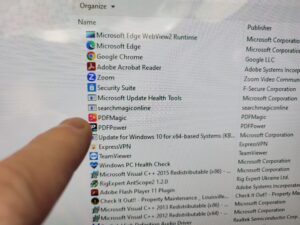 Computer viruses present a persistent threat to our digital lives, capable of wreaking havoc on our devices and compromising our valuable data. To safeguard your system, it’s crucial to adopt effective preventive practices. In this article, we highlight three practical ways to avoid computer viruses, ensuring a safe and secure computing experience.
Computer viruses present a persistent threat to our digital lives, capable of wreaking havoc on our devices and compromising our valuable data. To safeguard your system, it’s crucial to adopt effective preventive practices. In this article, we highlight three practical ways to avoid computer viruses, ensuring a safe and secure computing experience.
1. Exercise Internet Savviness: Safe browsing practices play a pivotal role in fending off viruses. When accessing the Internet, exercise caution and adhere to the following guidelines: a) Be Vigilant With Downloads: Be cautious when downloading files or software, particularly from unfamiliar websites or unsolicited email attachments. Verify the legitimacy of the sources and place trust solely in reputable platforms. Avoid clicking on tempting pop-up ads or suspicious links that may direct you to potentially infected websites. b) Be Wary of Phishing Attempts: Cybercriminals often exploit phishing techniques to trick users into unknowingly downloading viruses or sharing sensitive information. Always scrutinize emails or messages asking for personal details or financial information. Legitimate organizations rarely request such information through unsolicited emails. Be skeptical of suspicious email addresses, grammatical mistakes, or unexpected urgency in the message.
2. Update Software Regularly: Ensure your Windows Operating System, web browsers, and other software are up to date with the latest security patches and bug fixes. These updates often contain critical security enhancements that protect against newly discovered vulnerabilities, reducing the risk of infection. Although these updates are often supposed to update automatically often times they do not. Learn how to manually check for Windows up
3. Practice Smart Data Backup Regimes: Data Backups provide an additional layer of protection against computer viruses. While they don’t prevent infection a data backup makes it easy to recovery from an infection that requires a complete OS Installation on your computer. Follow these best practices to reduce vulnerability: a) Regular Data Backup: Create backups of your essential files and folders periodically. Use external hard drives or flash drives for these backups. In the event of a virus attack or system compromise, having a recent backup ensures data recovery and minimizes potential loss..
Conclusion: By following these three practical ideas exercising internet savviness, updating software and practicing smart data backups- you can significantly reduce the risk of falling victim to computer viruses catastrophes. Remain proactive and vigilant in your cybersecurity efforts to safeguard your system and ensure a secure computing experience.


